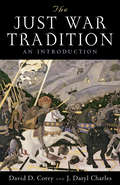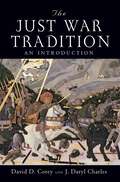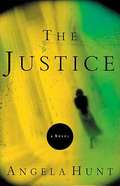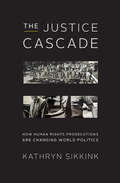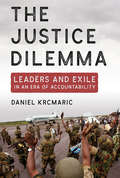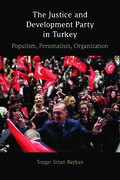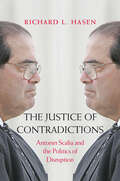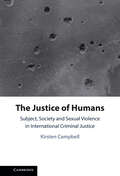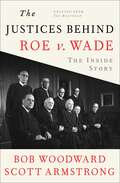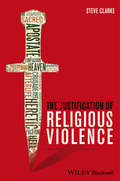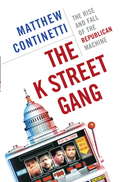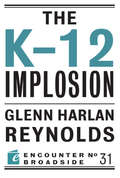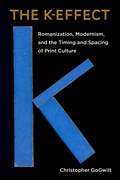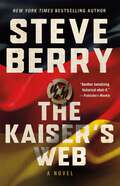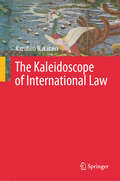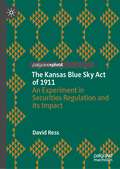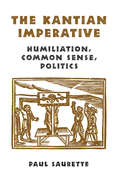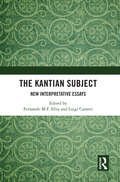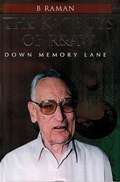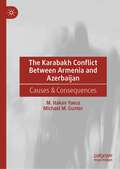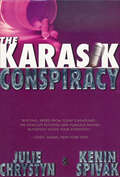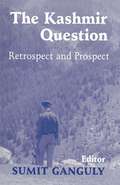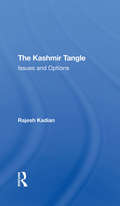- Table View
- List View
The Just War Tradition: An Introduction
by J. Daryl Charles David D. CoreyPoliticians, pundits, and scholars have cited the principles of "just war" to defend military actions from Iraq to Afghanistan to Libya. Other politicians, pundits, and scholars have cited just war principles to condemn those same military interventions. How can the same tradition lead to such sharply opposing conclusions? What is the just war tradition, and why is it important today? Authors David D. Corey and J. Daryl Charles answer those questions in this insightful exploration. A fascinating blend of history, theology, and political philosophy, The Just War Tradition: An Introduction traces the development of the tradition from its inception nearly two millennia ago. Corey and Charles illuminate how the various voices within the tradition--from Augustine and Aquinas, to Luther and Calvin, to Suárez and Locke, up to present-day commentators--relate to one another and to rival ways of understanding war and peace.
The Just War Tradition: An Introduction
by J. Daryl Charles David D. CoreyHow can some politicians, pundits, and scholars cite the principles of "just war" to defend military actions—and others to condemn those same interventions? Just what is the just war tradition, and why is it important today?Authors David D. Corey and J. Daryl Charles answer those questions in this fascinating and invaluable book. The Just War Tradition: An Introduction reintroduces the wisdom we desperately need in our foreign policy debates.
The Justice
by Angela Elwell HuntFollowing her running mate's assassination, Darryn Austin becomes the first female U.S. president---and is thrilled to be in the highest position in the land. She soon discovers the need for allys and spies to keep tabs on enemies who look like friends. The target of a would be assassin, she discovers just how far people will go to make sure she doesn't stay in office. When she appoints an old college flame to her cabinet, she hopes to rekindle the flame between them. She grooms him for a seat on the Supreme Court with the hope that she will be able to control future court decisions. When personal circumstances trigger his spiritual conversion, Paul becomes a threat---one she seeks to eliminate.
The Justice Cascade: How Human Rights Prosecutions Are Changing World Politics (The Norton Series in World Politics)
by Kathryn SikkinkAcclaimed scholar Kathryn Sikkink examines the important and controversial new trend of holding political leaders criminally accountable for human rights violations. Grawemeyer Award winner Kathryn Sikkink offers a landmark argument for human rights prosecutions as a powerful political tool. She shows how, in just three decades, state leaders in Latin America, Europe, and Africa have lost their immunity from any accountability for their human rights violations, becoming the subjects of highly publicized trials resulting in severe consequences. This shift is affecting the behavior of political leaders worldwide and may change the face of global politics as we know it. Drawing on extensive research and illuminating personal experience, Sikkink reveals how the stunning emergence of human rights prosecutions has come about; what effect it has had on democracy, conflict, and repression; and what it means for leaders and citizens everywhere, from Uruguay to the United States. The Justice Cascade is a vital read for anyone interested in the future of world politics and human rights.
The Justice Dilemma: Leaders and Exile in an Era of Accountability (Cornell Studies in Security Affairs)
by Daniel KrcmaricAbusive leaders are now held accountable for their crimes in a way that was unimaginable just a few decades ago. What are the consequences of this recent push for international justice? In The Justice Dilemma, Daniel Krcmaric explains why the "golden parachute" of exile is no longer an attractive retirement option for oppressive rulers. He argues that this is both a blessing and a curse: leaders culpable for atrocity crimes fight longer civil wars because they lack good exit options, but the threat of international prosecution deters some leaders from committing atrocities in the first place. The Justice Dilemma therefore diagnoses an inherent tension between conflict resolution and atrocity prevention, two of the signature goals of the international community.Krcmaric also sheds light on several important puzzles in world politics. Why do some rulers choose to fight until they are killed or captured? Why not simply save oneself by going into exile? Why do some civil conflicts last so much longer than others? Why has state-sponsored violence against civilians fallen in recent years? While exploring these questions, Krcmaric marshals statistical evidence on patterns of exile, civil war duration, and mass atrocity onset. He also reconstructs the decision-making processes of embattled leaders—including Muammar Gaddafi of Libya, Charles Taylor of Liberia, and Blaise Compaoré of Burkina Faso—to show how contemporary international justice both deters atrocities and prolongs conflicts.
The Justice and Development Party in Turkey: Populism, Personalism, Organization
by Toygar Sinan BaykanTurkish politics were remarkably reshaped in the early 2000s following the decline of the Islamist National View and the electoral breakthrough of the new Justice and Development Party (JDP) headed by Erdoğan. Beside its Islamist credentials, Erdoğan's JDP consistently and convincingly presented itself as the 'populist' defender of the downtrodden sectors of Turkish society. However, with Erdoğan's rise as the popularly elected president in 2014, Turkey's already fragile democratic system was driven in a more authoritarian direction. Shifting the focus away from structural factors, this book analyzes the political appeal and organisation of the JDP that granted them such unprecedented electoral resilience. With critical but accessible theoretical discussions, Toygar Sinan Baykan locates the JDP within the wider literature of populism, Islamist party politics, party organisations and authoritarianism. Over fifty in-depth interviews also help to relate the intimate story of Turkey's socio-cultural divides and the JDP's intraparty organisational dynamics, thereby offering a fresh account of Turkish politics.
The Justice of Contradictions: Antonin Scalia and the Politics of Disruption
by Richard L. Hasen“Superbly written, filled with brilliant insights . . . Both liberals and conservatives will see Scalia and his legacy in a new and more illuminating light.” —Adam Winkler, author of Gunfight: The Battle Over the Right to Bear Arms in AmericaEngaging but caustic and openly ideological, Antonin Scalia was among the most influential justices ever to serve on the United States Supreme Court. In this fascinating new book, legal scholar Richard L. Hasen assesses Scalia’s complex legacy as a conservative legal thinker and disruptive public intellectual.The left saw Scalia as an unscrupulous foe who amplified his judicial role with scathing dissents and outrageous public comments. The right viewed him as a rare principled justice committed to neutral tools of constitutional and statutory interpretation. Hasen provides a more nuanced perspective, demonstrating how Scalia was crucial to reshaping jurisprudence on issues from abortion to gun rights to separation of powers. A jumble of contradictions, Scalia promised neutral tools to legitimize the Supreme Court, but his jurisprudence and confrontational style moved the Court to the right, alienated potential allies, and helped to delegitimize the institution he was trying to save.“Absorbing . . . [a] book that, at least for this reader, shed new light on the law and how it is made, interpreted, and applied.” —Los Angeles Review of Books
The Justice of Humans: Subject, Society and Sexual Violence in International Criminal Justice
by Kirsten CampbellJustice for conflict-related sexual violence remains a critical problem for global society today. This ground-breaking book addresses pressing questions for 'international justice': what do existing approaches to international justice offer to victims of war and societies in conflict? And what possibilities do they provide for feminist social transformation? The Justice of Humans develops a new feminist approach to 'international justice'. Adopting a socio-legal perspective, it studies two major contemporary examples of legal and feminist approaches to justice, the International Criminal Tribunal for the former Yugoslavia and the Women's Court (former Yugoslavia), focusing on their treatment of sexual violence as a gender-based crime. Drawing on feminist social theory, legal analysis, and empirical research, the book offers an innovative feminist framework for understanding 'international justice' and offers new theoretical and practical strategies for building feminist justice.
The Justices Behind Roe V. Wade: The Inside Story, Adapted from The Brethren
by Bob Woodward Scott ArmstrongA thrilling, behind-the-scenes account of the revolutionary Roe v. Wade Supreme Court ruling.The Justices Behind Roe V. Wade offers a front-row seat to the inner workings of the Supreme Court that led to the monumental Roe v. Wade decision. Spanning from 1969 to 1972, Pulitzer Prize–winning author Bob Woodward and coauthor Scott Armstrong report on the masterful maneuvering and politicking that affected the court&’s decisions and created obstacles for the landmark ruling. Abridged from the #1 bestseller The Brethren, this is an exquisite work of reporting on one of the most important rulings of the United States.
The Justification of Religious Violence (Blackwell Public Philosophy Series #49)
by Steve ClarkeHow are justifications for religious violence developed and do they differ from secular justifications for violence? Can liberal societies tolerate potentially violent religious groups? Can those who accept religious justifications for violence be dissuaded from acting violently? Including six in-depth contemporary case studies, The Justification of Religious Violence is the first book to examine the logical structure of justifications of religious violence. The first book specifically devoted to examining the logical structure of justifications of religious violence Seeks to understand how justifications for religious violence are developed and how or if they differ from ordinary secular justifications of violence Examines 3 widely employed premises used in religious justifications of violence – ‘cosmic war’, the importance of the afterlife, and ‘sacred values’ Considers to what extent liberal democratic societies should tolerate who hold that their religion justifies violent acts Reflects on the possibility of effective policy measures to persuade those who believe that violent action is justified by religion, to refrain from acting violently Informed by recent work in psychology, cognitive science, neuroscience and evolutionary biology Part of the Blackwell Public Philosophy Series
The Justification of Responsibility in the UN Security Council: Practices of Normative Ordering in International Relations (Routledge Global Cooperation Series)
by Holger NiemannThe UN Security Council has been given the primary responsibility for maintaining international peace and security. The precise meaning of this responsibility, however, is contested. This lack of clarity is frequently criticised as a source of incoherent and selective decision-making, undermining the legitimacy of the Security Council. In case studies of the Security Council’s controversies on Iraq and Syria, this book instead reveals contestation and competing interpretations of responsibility as crucial conditions for the constitution and negotiation of normative order. The case studies also underline the importance of public Security Council meetings as dynamic sites for coping with a plurality of normative orders and how their symbolic and material manifestations shape processes of collective legitimation. This book concludes that these processes demonstrate the crucial role of justification and critique as practices of normative ordering in the Security Council.The Justification of Responsibility in the UN Security Council argues that normative orders in international organisations are constructed by multifaceted processes of questioning, reaffirming and coordinating claims of normativity and legitimacy. Connecting research on norms and legitimacy in international relations with pragmatist sociology, the book provides an account of the complexities and inconsistencies of decision-making processes and their normative foundations in international organisations. This book will be of interest to scholars and students of international organisations, international relations theory and global governance.
The K Street Gang
by Matthew Continetti"You've got to understand, we are ideologues," Tom DeLay once told a journalist. "We have an agenda. We have a philosophy. I want to repeal the Clean Air Act. No one came to me and said, 'Please repeal the Clean Air Act.' We say to the lobbyists, 'Help us.' We know what we want to do and we find the people to help us do that. We go to the lobbyists and say, 'Help us get this in the appropriations bill." It was a stunning admission. Lawmakers, DeLay was basically saying, relied on paid lobbyists to get bills passed, not the other way around. The federal government was so complex, the challenges of leadership so difficult, that lobbyists were more likely to get things done than the people's representatives. And DeLay, because of his "ideology," was happy to play along. The age of K Street had arrived. The Republicans were just along for the ride. from The K Street GangWhat happens when ideologues obtain power? The K Street Gang is the inside story of how a group of self-styled Republican reformers succumbed to the temptations of power, becoming even worse than the Democrats they had been elected to replace. Now, some of those very reformers, including Tom DeLay and Jack Abramoff, are under investigation, their careers and reputations tarnished by the very system they helped to create. The story begins in 1994, when a landslide victory led to the first GOP-controlled Congress in forty years. The Republicans had it all: a visionary leader in Speaker of the House Newt Gingrich, a program for reform in the Contract With America, and a bonafide electoral mandate. They pledged to shrink government, reform politics, and drain the swamp of public malfeasance. Ten years later the Republican party finds itself embroiled in crippling scandals that have already brought about the fall of House majority leader DeLay and may reach all the way into the White House. In The K Street Gang, you'll meet DeLay, the brazen ideologue and prodigious fundraiser who invited lobbyists to run amok in exchange for campaign contributions; Jack Abramoff, the conservative activist who left a troubled career in Hollywood for a new beginning as a Washington lobbyist, only to fleece his clients out of millions of dollars; Ralph Reed, the former executive director of the Christian Coalition whose principles took a backseat to his business interests; Grover Norquist, the fiery antitax activist who provided intellectual ammunition for the Republican takeover of the lobbying industry, only to see the lobbyists take over his party; and Adam Kidan, a down-on-his-luck Republican businessman who engineered the scam of a lifetime-one that had deadly consequences.You'll learn how mysterious Russian businessmen with ties to Soviet military intelligence paid for Tom DeLay's trip to Moscow, then sold weapons to Jack Abramoff who resold them to militant Israeli settlers; how Grover Norquist helped arranged meetings between George W. Bush and men who are now alleged to be Islamic terrorists; how a former lifeguard rose from beachbum to aide to one of Washington's most powerful congressmen to high-powered and extremely wealthy lobbyist, and how he lost it all; and how a routine audit of an obscure Indian tribe's finances has led to a widespread public corruption investigation that threatens the political futures of half a dozen congressmen and the political future of the Republican Party.In The K Street Gang, Matthew Continetti takes us behind the headlines to meet a group of young idealists who came to Washington to do good and ended up staying to do well. It's about the perils of power and the high cost of greed. Above all, it's about how the American conservative movement began as a cause, turned into a career and ended up as a racket.
The K-12 Implosion
by Glenn Harlan ReynoldsEconomist Herb Stein famously said that something that can't go on forever, won't. For decades now, America has been putting ever-growing amounts of money into its K-12 education system, while getting steadily poorer results. Now parents are losing faith in public schools, new alternatives are appearing, and change is on the way. The K-12 Implosion provides a succinct description of what's wrong, and where the solutions are likely to appear, along with advice for parents, educators, and taxpayers.
The K-Effect: Romanization, Modernism, and the Timing and Spacing of Print Culture
by Christopher GoGwiltThe K-Effect shows how the roman alphabet has functioned as a standardizing global model for modern print culture. Investigating the history and ongoing effects of romanization, Christopher GoGwilt reads modernism in a global and comparative perspective, through the works of Joseph Conrad and others. The book explores the ambiguous effect of romanized transliteration both in the service of colonization and as an instrument of decolonization. This simultaneously standardizing and destabilizing effect is abbreviated in the way the letter K indexes changing hierarchies in the relation between languages and scripts. The book traces this K-effect through the linguistic work of transliteration and its aesthetic organization in transnational modernism.The book examines a variety of different cases of romanization: the historical shift from Arabic script to romanized print form in writing Malay; the politicization of language and script reforms across Russia and Central Europe; the role of Chinese debates about romanization in shaping global transformations in print media; and the place of romanization between ancient Sanskrit models of language and script and contemporary digital forms of coding. Each case study develops an analysis of Conrad’s fiction read in comparison with such other writers as James Joyce, Lu Xun, Franz Kafka, and Pramoedya Ananta Toer. The first sustained cultural study of romanization, The K-Effect proposes an important new way to assess the multi-lingual and multi-script coordinates of modern print culture.
The Kaiser's Web: A Novel (Cotton Malone #16)
by Steve BerryIn New York Times bestseller Steve Berry’s latest Cotton Malone adventure, a secret dossier from a World War II-era Soviet spy comes to light containing information that, if proven true, would not only rewrite history — it could impact Germany's upcoming national elections and forever alter the political landscape of Europe.Two candidates are vying to become Chancellor of Germany. One is a patriot having served for the past sixteen years, the other a usurper, stoking the flames of nationalistic hate. Both harbor secrets, but only one knows the truth about the other. They are on a collision course, all turning on the events of one fateful day — April 30, 1945 — and what happened deep beneath Berlin in the Fürherbunker. Did Adolph Hitler and Eva Braun die there? Did Martin Bormann, Hitler’s close confidant, manage to escape? And, even more important, where did billions in Nazi wealth disappear to in the waning days of World War II? The answers to these questions will determine who becomes the next Chancellor of Germany. From the mysterious Chilean lake district, to the dangerous mesas of South Africa, and finally into the secret vaults of Switzerland, former-Justice Department agent Cotton Malone discovers the truth about the fates of Hitler, Braun, and Bormann. Revelations that could not only transform Europe, but finally expose a mystery known as the Kaiser’s web.
The Kaleidoscope of International Law
by Kazuhiro NakataniThis book is a collection of updated and enhanced versions of the author's articles published in English over the past 30 years. It covers a wide range of areas and deals with many practical problems of international law which, despite their diplomatic importance, have been neglected by academics. For example, the book explores the applicability of negotiorum gestio to the planetary climate crisis, international legal problems between sovereign wealth fund holders and recipients, and the possibility of using the frozen assets of the Russian Central Bank. Through joint research and discussions with diplomats and government officials, the author came to realise that what really matters in diplomacy is different from what academics are interested in. On the basis of this conviction, he has included here articles which he considers useful not only for the academic study of international law but also for diplomatic practice. This book covers broad areas of international law and also touches on Japanese ideas of international law.
The Kansas Blue Sky Act of 1911: An Experiment in Securities Regulation and its Impact
by David RessThis Palgrave Pivot presents the first in-depth study of the pioneering Kansas Blue Sky Act of 1911, the first effort in American financial history to regulate the sale of securities in the US. Though offering a balanced examination of critiques of the legislation as a barrier to individual liberty, interstate commerce, and economic growth, the author challenges the prevailing view of the Kansas Act as a complete anomaly, instead exploring sensitively what ‘blue sky laws’ can tell us about small-town market values during the nineteenth-century. Drawing on contemporary accounts of rural commerce and popular stereotypes about rural society, the author takes a cultural-historical approach to the politics of regulation and government intervention in the economy. Situating the Blue Sky Act in the broader context of Progressive Era reforms, the author demonstrates how distinctive patterns of commerce and finance in the self-contained, miniature economies of mid-continental rural communities were often at odds with the “caveat emptor” (buyer beware) standard of American law and commerce in larger markets. Instead the author explores how paternalistic assumptions about individual investment decisions led to the creation of the Act, yet how it was doomed to failure in the context of emerging national stock markets, changing attitudes that regarded stock primarily as a vehicle for trade and the market boom of the 1920s. The book also explores how the initial acceptance of the Kansas model in other states and its later rejection provides a lens through which to examine the fluidity of notions of individual liberty during this period of fast economic and social change. This book will be of interest to researchers working in American financial history, as well as legal history and securities law.
The Kantian Imperative: Humiliation, Common Sense, Politics
by Paul SauretteImmanuel Kant's moral philosophy is almost universally understood as the attempt to analyse and defend a morality based on individual autonomy. In The Kantian Imperative, Paul Saurette challenges this interpretation by arguing that Kant's 'imperative' is actually based on a problematic appeal to 'common sense' and that it is premised on, and seeks to further cultivate and intensify, the feeling of humiliation in every moral subject.Discerning the influence of this model on a wide variety of historical and contemporary political thought and philosophy and critical of its implications, Saurette explores its impact on the work of two seminal and contemporary thinkers in particular: Charles Taylor and Jürgen Habermas. Saurette also shows that an analysis of the Kantian imperative allows a better understanding of current political problems such as the U.S. torture scandal at Abu Ghraib in Iraq and broader post-9/11 U.S. foreign policy. The Kantian Imperative thus demonstrates that philosophy and political theory are as relevant to contemporary events as at any other time in history.
The Kantian Subject: New Interpretative Essays
by Fernando M.F. Silva and Luigi CarantiThis book presents a critical reconsideration of the Kantian cognitive and practical subject. Special attention is devoted to highlight the complex relation between subjectivity as it is presented in the three critiques and the way in which it is construed in other writings, in particular the Anthropology. While for Kant our cognitive apparatus and the structure of our will are common to all humans, the anthropological subject reveals degrees of variation, depending on a myriad of external circumstances that pose a challenge to the unity of Kant’s account and await theoretical solutions. The essays collected in the volume delve into how the different shapes of human nature are not unrelated. They explore how and why different “Kantian subjects” are closely connected and at their core, if not entirely unified. The notions of personality, humanity, and citizenship will serve as leading threads for the reconstruction of this possible underlying unity. An engaging read that promises to deepen our understanding of human nature, the volume will be of great interest to scholars and researchers of philosophy, politics, psychology, social anthropology, ethics, and epistemology.
The Kaoboys Of R&aw - Down Memory Lane: Down Memory Lane
by B. RamanThis book deals largely with those aspects of the working of the Research and Analysis Wing (R&AW), of which the author had personal knowledge while serving in the organization for 26 years. The book traverses through India’s contemporary history—most importantly the 1971 war; insurgency in the Northeast, Punjab, and Kashmir; the Emergency; the war in Afghanistan; and the intelligence imperatives and dispensation under Indira Gandhi, Morarji Desai, Rajiv Gandhi, V.P. Singh, Chandra Shekhar, and Narasimha Rao. Written with the purpose that a knowledge of the role played by R&AW in those events would possibly enable a better understanding of its strengths and weaknesses, it painstakingly avoids over-statements, exaggerations and spins.
The Karabakh Conflict Between Armenia and Azerbaijan: Causes & Consequences
by Michael M. Gunter M. Hakan YavuzThis book focuses on Post-Soviet ethnic conflicts and Russia's involvement in them. In light of its significant importance for general ethnic conflict, specifically the post-Soviet Caucasus, along with the most recent war just fought over the area from September-November 2020, this book appropriately argues that it is time to reconsider Karabakh. This project deals with the historical, social and political aspects of the Karabakh issue regarding its origins, development and the current status of the conflict subsequent to the war in the autumn of 2020. Thus, the main themes will stress these points, as well as the importance of the Karabakh issue for the future, by considering its precedents and implications for other secessionist wars. This book also explores how such wars begin and end, the international legal precedents of self-determination versus territorial integrity, its implications for post-Soviet developments and conflicts, and the latest successful weapons developments lessons from the recent war involving drones, among others such as Azerbaijan’s rich oil reserves.
The Karasik Conspiracy
by Julie Chrystyn Kenin M. SpivakThe book the pharmaceuticals industry tried to commission, then control, and finally kill!.Born in Communist-controlled Bosnia, billionaire Ken Karasik has devoted his life to securing freedom for the Slavs in the Balkans— at any price. When Slobodan Milosevic kills Karasik' s family, the billionaire sets in motion his revenge— the deadliest terror attack in history— by tainting select drugs throughout the world. In an ironic parallel, the pharmaceutical giant PharmCorp has a similar plan, with so that it can protect its billions in profits. Thousands may die before anyone even knows either attack has begun.Enter FBI agent Barry Weiner and his sexy new paramour, investigator Francine Pye, who must stop both the billionaire and the drug giant— before Karasik and PharmCorp are able to execute their lethal plans on a global scale.
The Kashmir Question: Retrospect and Prospect
by Sumit GangulyIndia, which had been created as a civic polity, initially sought to hold on to this Muslim-majority state to demonstrate its secular credentials. Pakistan, in turn, had laid claim to Kashmir because it had been created as the homeland for the Muslims of South Asia. After the break-up of Pakistan in 1971 the Pakistani irredentist claim to Kashmir lost substantial ground. If Pakistan could not cohere on the basis of religion alone it had few moral claims on its co-religionists in Kashmir. Similarly, in the 1980s, as the practice of Indian secularism was eroded, India's claim to Kashmir on the grounds of secularism largely came apart. Today their respective claims to Kashmir are mostly on the basis of statecraft. This title provides a comprehensive assessment of a number of different facets of the on-going dispute over Kashmir between India and Pakistan. Among other matters, it examines the respective endgames of both states, the evolution of American policy toward the dispute, the dangers of nuclear esculation in the region and the state of the insurgency in the Indian-controlled portion of the disputed state.
The Kashmir Tangle: Issues And Options
by Rajesh KadianWith rare objectivity, Rajesh Kadian assesses past and present conflicts in Kashmir, one of the world’s most long-standing trouble spots. He traces the regions controversial history from the 1947 partition to the surging tide of militancy now building in the Kashmir Valley, which has further strained relations between India and Pakistan. Kadians si
